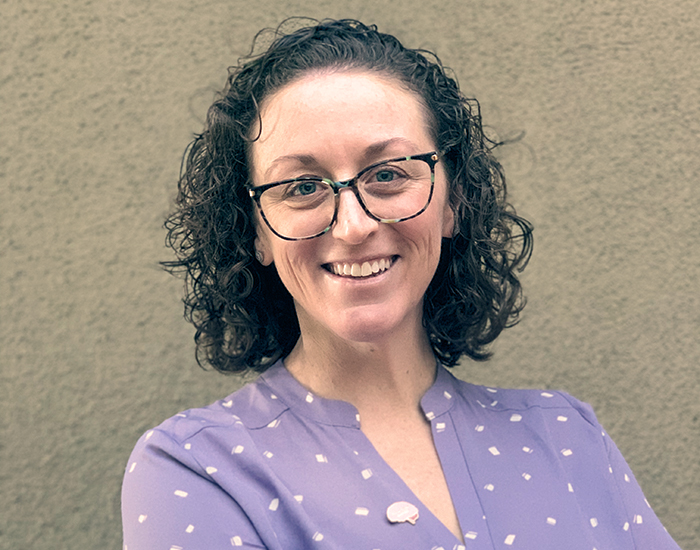Teaching eight hours of live, online lectures in an enjoyable way—and enables students to retain the information—is no easy task. However, Amanda Ingalls—who recently joined Keck Graduate Institute as Director of Didactic Education for the Master of Science in Physician Assistant Studies (MSPA) program—has accomplished this and much more.
Her accomplishments were honored by the Osmosis Raise the Line Faculty Awards, which celebrates inspirational healthcare educators around the globe. Ingalls, who taught at the University of Southern California (USC) for more than five years, was named as a winner in the Physician Assistant (PA) category.
“What matters to me most about any kind of recognition is that it comes from students,” Ingalls said. “For me, this profession is about engaging with the students, helping them to learn, and having some humor in the classroom so they truly enjoy this process. I’m grateful that they took the time out of their already full life to give me that recognition.”
While working as a PA, she quickly discovered that patient education was the most rewarding part of the job for her. However, teaching has always been in her blood.
“My mother and my grandmother were both really gifted and talented teachers who were dedicated to their students,” Ingalls said.
Her first rule of teaching is to put herself in the students’ shoes.
“A tenet I strive to live by is remembering what it feels like to be in the students’ position, learning something for the first time,” Ingalls said. “They don’t have the benefit of being in my academic position for the years that I have.”
Thus, Ingalls takes note of the complexities in the information, anticipates where students might get lost, and adjusts her teaching to account for and clarify areas of confusion. She often uses mnemonics and anecdotes to help students understand the information and retain it.
“Not everybody automatically understands how things work or go wrong in the body,” Ingalls said. “So I’ll often give a real-life example or familiar analogy related to the disease. This helps them to anchor the information, so they’re not just memorizing but truly understanding the concepts, with the goal of long-term retention. Then when they go out into the world and begin practicing medicine, they are not having to relearn the information but rather are continuing to build on a strong foundation.”
She looks forward to continuing to exercise her passion for teaching while taking on a new leadership role as Director of Didactic Education in KGI’s MSPA program.
“I wanted to be in a place where I could have a tangible influence on the curriculum and voice my thoughts on new directions for PA education,” Ingalls said. “I see this opportunity at KGI, where the PA program is just starting out and finding its personality.”
“I’m excited to be in a place where there are so many opportunities for collaboration and experimentation while keeping the students’ educational outcomes at the forefront.”
Some of her goals regarding PA education are integrating more information on nutrition into the curriculum and developing a remediation policy that provides extra support to struggling students. For the latter, she also wants to change the stigma towards remediation. Generally, students tend to view it as a punishment or a negative reflection of their academic abilities.
“PA school is notoriously fast-paced, with large volumes of content within a very compressed period of time,” Ingalls said. “Even students who never struggled in the past may experience challenges. Remediation is an acknowledgment that everybody is capable of doing this work, and even if you have a bump in the road, we have mechanisms in place to ensure that you still feel confident in the knowledge and skills needed to thrive in the profession.”
Overall, Ingalls values the opportunity to create policies that will benefit students and the PA profession as a whole. Her biggest passion, though, is being in the classroom.
“There’s nothing quite like the noise that a classroom makes when they finally understand something very complex,” Ingalls said. “If I could bottle that sound and sell it, I’d probably be the richest person alive. And watching students move through graduate education is really satisfying. They change so much but don’t recognize it because they’re so busy. I get to observe them from the outside as they grow and build confidence.”
Ingalls is grateful for all her opportunities and is excited to continue the next phase of her journey with KGI.
“I’m so thankful that KGI has put their faith and support behind the PA program and built such a strong foundation,” Ingalls said. “I’m proud that this program is taking a different look at how PA education can be run and maintaining that student focus.”
